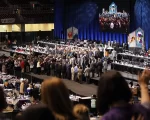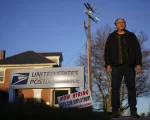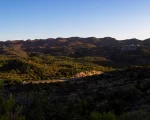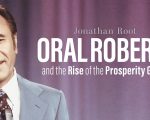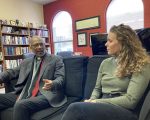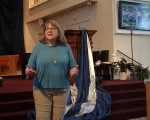News
France’s Highest Administrative Court Says the Soccer Federation Can Ban Headscarves in Matches
The ruling is likely to refuel the lingering debate on secularism — still volatile more than a century after the 1905 law on separation of church and state that established it as a principle of the French Republic.
Blessing in a Schism
This issue of A Public Witness attends multiple disaffiliation blessings — from Southern Baptist to United Methodist and Mennonite — to consider different models for denominational partings.
Supreme Court Solidifies Protections for Workers Who Ask for Religious Accommodations
The Supreme Court on Thursday used the case of a Christian mailman who didn’t want to work Sundays to solidify protections for workers who ask for religious accommodations.
Arizona’s Oak Flat Is Sacred Land to Some Native Americans, but It’s Endangered by a Plan for a Mine
A religiously diverse coalition — Christian, Muslim, Sikh, and other Native American groups — has backed the Apache Stronghold by filing amicus briefs.
Review & Giveaway: Spiritual Care
Sociologist Wendy Cadge's "Spiritual Care: The Everyday Work of Chaplains" is an in-depth study that fills a gaping hole in understanding how religious care is provided within the United States.
Review: Oral Roberts and the Rise of the Prosperity Gospel
Jonathan Root's Oral Roberts biography offers insights into a significant element in American Christianity as well as a cautionary tale about crass materialism.
Ministers Reflect on Praying in Death Chambers
Four ministers who have been in a death chamber in recent months during state executions shared their experiences Saturday during the annual meeting of Missourians to Abolish the Death Penalty.
For Church Worship Teams, Auto-Tune Covers a Multitude of Sins. Especially Online.
The boom in livestreaming and the ubiquity of Auto-Tune and other technologies have led churches to up their game when it comes to sound technology. But has it gone too far?
In Europe’s Empty Churches, Prayer and Confessions Make Way for Drinking and Dancing
Across Europe, the continent that nurtured Christianity for most of two millennia, churches, convents, and chapels stand empty and increasingly derelict as faith and church attendance shriveled over the past half century.
Wrestling With History
This issue of A Public Witness provides a seat to listen to a recent lecture by Diana Butler Bass as she considers the stories we tell about history, especially about race and religion.


